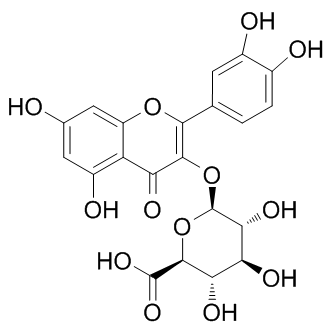All AbMole products are for research use only, cannot be used for human consumption.

In vitro: Miquelianin shows an antioxidant effect in human plasma. At 50 μM, miquelianin suppresses the consumption of the three antioxidants lycopene, β-carotene and α-tocopherol significantly. In vitro studies indicate that miquelianin is able to reach the central nervous system from the small intestine. Miquelianin significantly reduces the generation of β-amyloid (Aβ) peptides by primary neuron cultures generated from the Tg2576 AD mouse model. It is also capable of interfering with the initial protein-protein interaction of Aβ1–40 and Aβ1–42 that is necessary for the formation of neurotoxic oligomeric Aβ species. Treatment with 0.1 μM miquelianin suppresses ROS generation, cAMP and RAS activation, phosphorylation of ERK1/2 and the expression of HMOX1, MMP2, and MMP9 genes. Miquelianin suppresses invasion of MDA-MB-231 breast cancer cells and MMP-9 induction, and inhibits the binding of [3H]-NA to b2-AR. Miquelianin may function to suppress invasion of breast cancer cells by controlling b2-adrenergic signaling, and may be a dietary chemopreventive factor for stress-related breast cancer. In vivo: Miquelianin treatment, compared to vehicle-control treatment, significantly improves AD-type deficits in hippocampal formation basal synaptic transmission and long-term potentiation. A flavonoid fraction obtained from a crude extract of Hypericum perforatum (St. John's wort) is remarkably active in the forced swimming test. Miquelianin is one of the compound separated from the fraction.
| Cell Experiment | |
|---|---|
| Cell lines | 14–16 corticohippocampal neuronal |
| Preparation method | Freshly isolated low-molecular-weight Aβ1–42 (25 μM) or Aβ1–40 (25 μM) peptide (18 μl) was mixed with 1 μl of 1 mm tris-(2,2′-bipyridyl)dichlororuthenium(II) [Ru(Bpy)] and 1 μl of 20 mM ammonium persulfate in the presence or absence of 25 μM quercetin-3-O-glucuronide in 10 mM phosphate. |
| Concentrations | 25 μM |
| Incubation time | |
| Animal Experiment | |
|---|---|
| Animal models | Tg2576 mice |
| Formulation | |
| Dosages | |
| Administration | |
| Molecular Weight | 478.36 |
| Formula | C21H18O13 |
| CAS Number | 22688-79-5 |
| Form | Solid |
| Solubility (25°C) | 30 mg/mL in DMSO |
| Storage |
Powder -20°C 3 years ; 4°C 2 years In solvent -80°C 6 months ; -20°C 1 month |
| Related Metabolite/Endogenous Metabolite Products |
|---|
| 6α-Hydroxy Paclitaxel
6α-Hydroxy Paclitaxel is a primary metabolite of Paclitaxel. 6α-Hydroxy Paclitaxel (6-Hydroxytaxol) retains a time-dependent effect on organic anion-transporting polypeptides 1B1/SLCO1B1 (OATP1B1) with similar inhibition potency to Paclitaxel, whereas it no longer showed time-dependent inhibition of OATP1B3. |
| Casein (from bovine milk)
Casein is a phosphorus-containing complex protein with α-casein and β-casein as its main components. Casein is an orally active phosphoprotein that can be separated into various electrophoretic components, such as α2-Casein, κ-Casein, β-casein, and γ-casein. Casein can be used in biochemical research, to formulate biological culture media, and as a thickener, emulsifier and stabiliser. |
| Palmitic acid-13C16
Palmitic acid-13C16 is the 13C-labeled Palmitic acid. Palmitic acid is a long-chain saturated fatty acid commonly found in both animals and plants. |
| Methionine sulfoximine
Methionine sulfoximine (2-Amino-4-(S-methylsulfonimidoyl)butanoic acid) is an irreversible inhibitor of glutamine synthetase. Methionine sulfoximine is able to affect the metabolism of glutamate and glutamine. |
| L-Glutamine-15N2
L-Glutamine-15N2 is the 15N-labeled L-Glutamine. L-Glutamine is a non-essential amino acid present abundantly throughout the body and involved in many metabolic processes. L-Glutamine provides a source of carbons for oxidation in some cells. |
All AbMole products are for research use only, cannot be used for human consumption or veterinary use. We do not provide products or services to individuals. Please comply with the intended use and do not use AbMole products for any other purpose.


Products are for research use only. Not for human use. We do not sell to patients.
© Copyright 2010-2024 AbMole BioScience. All Rights Reserved.
